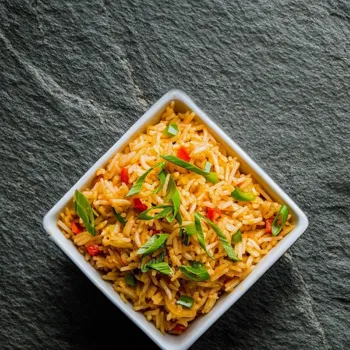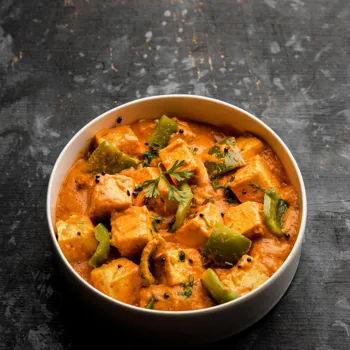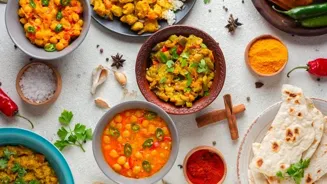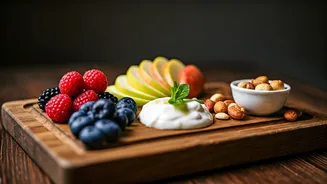Explore Vegan Indian Cooking: Recipes & Benefits. Dive into diverse, flavorful vegan dishes rooted in India's rich culinary heritage
Incredible India, a land known for its vibrant culture, rich history,
and, of course, its diverse and flavorful cuisine.
While Indian food is often associated with creamy dairy-based dishes and ghee-laden sweets, a delicious and surprisingly diverse world of vegan Indian cooking is waiting to be explored.
Embracing vegan Indian food is not just about dietary choices; it's about discovering a new way to appreciate the flavors of India while reaping numerous health and environmental benefits.
Many traditional Indian dishes are inherently vegan, and with a few clever substitutions, even typically dairy-heavy recipes can be transformed into plant-based delights. So, let's embark on this culinary journey and discover why you should explore the world of vegan Indian cooking.
Vegan Indian cooking: rich in flavor, nutrients, and tradition
One of the most compelling reasons to delve into vegan Indian cooking is the sheer abundance of naturally vegan dishes that already exist.
Think about it: dal (lentil soup), chana masala (chickpea curry), aloo gobi (potato and cauliflower curry), various vegetable stir-fries, and flavorful rice preparations – all inherently vegan and bursting with flavor.
These dishes are often packed with nutrients, fiber, and plant-based protein, making them a healthy and satisfying choice. Exploring these traditional recipes allows you to connect with the roots of Indian cuisine while embracing a plant-based lifestyle.
You'll be surprised at the variety and depth of flavors you can achieve without any animal products. Using fresh, seasonal vegetables, aromatic spices and traditional cooking can transform the food to a super delicious one.
Vegan Indian cooking boosts health with nutrient-rich ingredients
Vegan Indian cooking is also a fantastic way to boost your health. Plant-based diets are generally lower in saturated fat and cholesterol, which can help reduce the risk of heart disease, type 2 diabetes, and certain types of cancer.

The abundance of vegetables, legumes, and spices in vegan Indian dishes provides a wealth of vitamins, minerals, antioxidants, and fiber, all essential for maintaining good health. For example, turmeric, a key ingredient in many Indian dishes, has powerful anti-inflammatory properties.
Ginger, another common ingredient, can aid digestion and boost immunity. Incorporating more vegan Indian meals into your diet can be a delicious and easy way to improve your overall well-being. In most of the dishes, the vegetables are not too cooked and thus all nutrients stay intact.
Embracing vegan Indian cooking benefits health and the environment, reducing environmental impact
Beyond the health benefits, embracing vegan Indian cooking can also have a positive impact on the environment. Animal agriculture is a significant contributor to greenhouse gas emissions, deforestation, and water pollution.

By reducing or eliminating your consumption of animal products, you can help reduce your environmental footprint. Choosing plant-based options also promotes more sustainable agriculture and reduces the demand for resource-intensive animal farming.
Cooking vegan Indian food is a simple yet powerful way to make a conscious choice that benefits both your health and the planet, and also it promotes the use of locally grown foods. Consuming plant based diet is more sustainable for the environment.
Mouthwatering vegan Indian recipes to try at home
Now, let's talk about some mouthwatering vegan Indian recipes that you can easily try at home. Start with a classic dal tadka, a flavorful lentil soup tempered with aromatic spices. Substitute ghee with vegetable oil for the tempering.
Another must-try is chana masala, a tangy and slightly spicy chickpea curry that pairs perfectly with rice or roti. For a hearty vegetable dish, try aloo gobi, a dry curry made with potatoes and cauliflower, seasoned with turmeric, cumin, and coriander. Don't forget the sides!
Raita can be made vegan by using plant-based yogurt, like coconut or almond yogurt. And for a sweet treat, try gajar ka halwa made with grated carrots, nuts, and plant based milk. These recipes are just a starting point – the possibilities are endless!
Tips for easier vegan Indian cooking: master spices, stock pantry, use plant-based dairy, experiment freely
To make your vegan Indian cooking journey even easier, here are a few tips. First, familiarize yourself with common Indian spices and learn how to use them effectively. Experiment with different combinations to create your own unique flavor profiles.
Second, stock your pantry with essential ingredients like lentils, chickpeas, rice, and various vegetables. Third, don't be afraid to substitute dairy products with plant-based alternatives. Coconut milk, almond milk, and cashew cream are all excellent substitutes for dairy in Indian dishes.
Finally, remember that cooking is an art, not a science. Don't be afraid to experiment and adjust recipes to your liking. With a little practice, you'll be able to create delicious and authentic vegan Indian meals that everyone will enjoy.
Embracing vegan Indian cuisine is a journey of discovery, flavor, and well-being. It's an opportunity to explore the richness of Indian culinary traditions while making a positive impact on your health and the environment. So, why not start your vegan Indian cooking adventure today!













